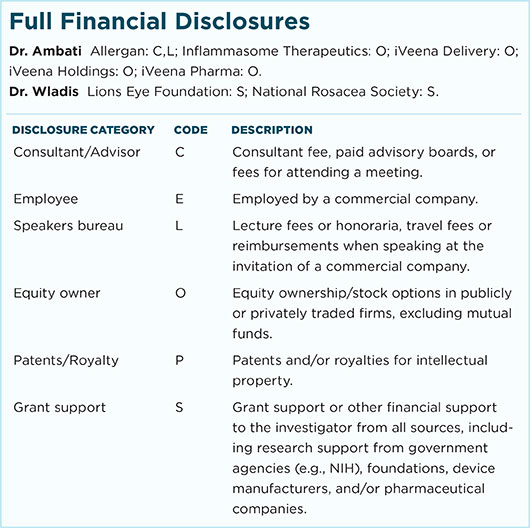Download PDF
Ocular surface disease (OSD) affects some 15% of Americans 65 and older and is one of the most common reasons for a visit to the ophthalmologist. Meibomian gland disease (MGD), which causes instability of the tear film, frequently contributes to OSD.
An Academy Ophthalmic Technology Assessment (OTA) has delivered a mixed message on the use of oral antibiotics to treat OSD related to MGD. After reviewing the literature, the OTA committee found that while oral antibiotics appear to be beneficial in treating at least some patients with OSD, there is no level I evidence to support their widespread use.1
Examining the literature. The review yielded 87 articles reporting investigations to evaluate the efficacy of oral doxycycline, minocycline, or azithromycin in managing OSD. Eight studies met the inclusion criteria for use in the final analysis, and each of these demonstrated some therapeutic benefit for the outcomes assessed. But how strong is the supporting evidence? Two of the 8 studies were graded as providing level II evidence, and 6 were graded level III.
“The studies demonstrated at least some utility, and the reported benefits were often quite robust,” said committee member Edward J. Wladis, MD, associate professor of ophthalmology, Albany Medical College. He added, however, that further investigations are needed to confirm existing study results and to define the benefits patients may expect to receive for antibiotic therapy.
The dearth of studies for so common a clinical scenario surprised Dr. Wladis. “Hopefully, stronger future studies will provide a clearer road map,” he said.
Quality of Evidence
Level I: Well-conducted randomized controlled trials (RCTs)
Level II: Well-conducted case-control or cohort studies and lower-quality RCTs
Level III: Case series and lower-quality case-control and cohort studies
|
Clinical considerations. For now, he advised doctors to reserve antibiotic use for patients whose MGD has not responded to standard treatments, such as warm compresses and topical lubrication. He also warned doctors to be mindful of side effects in patients with worrisome allergies and comorbidities, such as a history of Stevens-Johnson syndrome or difficult-to-manage anticoagulation.
“Clinicians should have open conversations with their patients regarding possible side effects of these agents and the level of confidence that they should place in them,” Dr. Wladis said.
—Miriam Karmel
___________________________
1 Wladis EJ et al. Ophthalmology. 2016;123(3): 492-496.
___________________________
Relevant financial disclosures: Dr. Wladis—None.
For full disclosures and disclosure key, see below.

More from this month’s News in Review